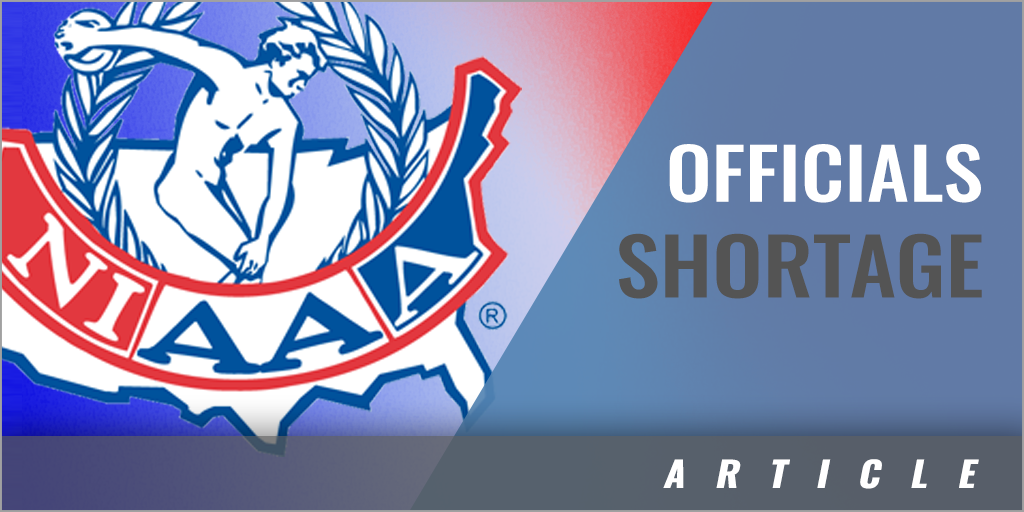|
By: Gary Stevens, Athletic Administrator at Thornton Academy - Saco, Maine Jeff Benson is not a man who is averse to meeting and addressing challenges. A successful athletic administrator and baseball coach at four Maine high schools, Benson also has distinguished himself as one of the state's top high school sports officials and has been a fixture at state championship games. Known for his keen judgment, sense of fairness, and ability to remain calm under pressure, he has earned a reputation of being one of the most respected figures in Maine interscholastic circles. When the Maine Principals' Association (MPA) - the state's high school athletic governing body - developed the position of Commissioner of Officials to serve each of its athletic boards, Jeff Benson was a logical choice to be the initial holder of the office. In addition to assisting the MPA with negotiating contracts with each official's organization, Benson also assumed a few other tasks in this role. Among those activities are establishing a coordinated evaluation system, ensuring that the most qualified individuals work in postseason events, and recruiting new people into the profession. The latter component has proven to be among the most challenging parts of his job. "The average age of our officials is 54, and the situation has only been made worse during COVID-19," Benson said. Given that many individuals opted not to return to their duties during the COVID-19 pandemic due to health concerns or a worry that they may lose work time in their full-time vocations based upon suspected close contact to a positive case, the pool of game officials shrunk markedly during that time. Some boards operated at only 50-60% of their normal capacity while being asked to cover a traditional number of games. Although Benson and others in his role may reasonably anticipate that some officials may resume working in a post-COVID world, the fact remains that the pandemic only exacerbated a problem that has been in existence for several years. The exodus of game officials from the profession has been an on-going phenomenon throughout the last decade. In turn, the demand for their services is exceeding the available supply at an increasing rate. Officiating boards throughout the United States are seeking new avenues, including social media campaigns and a partnership with the National Federation of State High School Associations (NFHS), to replenish their depleting ranks. Officials' groups need not be alone in addressing a problem borne out of the twenty-first century and made worse during a world health crisis. High school athletic administrators may hold the key to addressing this vital initiative. By looking inward at their event management practices and utilizing their vast networks of resources and contacts, people in leadership roles in education-based athletics are in a position to help stanch the flow of people out of the officiating profession. Fanning the Flames: The Growing Toxicity of High School Sports Roy Turner, who serves as the Executive Director of the North Carolina Athletic Directors Association, is a longtime member of the National Interscholastic Athletic Administrators Association and was selected to that organization's Hall of Fame. Turner cites addressing spectator behavior as one of the major leadership challenges faced by today's high school athletic directors. Disrespectful student chants, rancor exhibited towards opposing coaches and players, and verbal or visual disdain expressed on officials' calls are among the myriad of ways in which this problem is manifested. The result is a growing toxicity in high school arenas and stadiums throughout the country. Values that are taught and reinforced during the school day are placed on hold or ignored totally once the first whistle of a contest is blown. Unfortunately, many athletic directors overlook or, in some cases, condone this conduct. As Turner notes, "an athletic administrator promotes what he or she permits." High school officials echo Turner's sentiments. In a recent study by Ohio University, referees cite the increasing negativity of spectator behavior associated with high school athletics is one of the primary reasons for their exodus from the profession. As verbal - and in some very well documented cases - physical abuse has become associated with the job, many officials are "throwing in the towel" prematurely. Spectator behavior has sapped their energy and enthusiasm for what they are doing; nearly 86% of officials answering one poll stated that they would consider retiring from officiating altogether if current trends continue. What is suggested by the evolving dynamic is that high school athletic leaders throughout the country should take stock of their own situations. Among the strategies that athletic directors can employ to enhance the game day environment are:
In conjunction with this initiative, athletic directors need to work closely with members of their coaching staff to create an education-based environment in their schools. From the hiring process through on-going observation and evaluation of a coach's work, athletic administrators are in a position to reinforce those values espoused by the organization and measure a coach's capacity for carrying them out. A coach who can interact appropriately with officials while remaining within acceptable professional boundaries can have a positive impact upon the game environment. Their behavior serves as a cue for the fans cheering (or jeering) in the stands. Playing the Perfect Host: An Athletic Administrator's Interactions with Game Officials Hospitality is a hallmark of a seasoned, skilled education-based athletic leader. Athletic directors can also provide a strong example and contribute to a positive sporting environment through their direct interactions with the officials who are assigned to work their contests. Treating officials with dignity, professionalism, and respect can have a significant impact upon those serving in a role whose pay is not commensurate with the degree of pressure that they may feel. A checklist for athletic directors to consider implementing includes:
Closing the process is as important as managing the minutiae of one's interactions with officials. A simple "thank you" and a handshake following the contest signify goodwill and help officials leave the game venue feeling valued and appreciated. If an official demonstrates exemplary effort or professionalism, a note to that individual and/or his or her supervisors or evaluators is worth the time it takes to write it. Aiding in the Recruiting Process By virtue of his or her role in a leadership position, a high school athletic director is in a strong position to assist officiating boards in their recruiting efforts. In addition to reposting social media advertising from the NFHS and state athletic associations, and forwarding e-blasts to prospective officials, the high school athletic director is frequently in direct contact with individuals who may comprise the next generation of officials. Given that the fate of high school athletics is largely dependent upon the supply of people to service them, the importance of those efforts cannot be understated. A population of individuals under the athletic administrator's influence who may be prime recruits for this role are the student-athletes he or she serves. Encouraging coaches to have their team members get involved in officiating local youth games is not only an effective community relations strategy, but also allows students to learn about the rules of the game and get a taste of the work of an official. Some clubs and recreational organizations have junior officiating programs where students can get an introductory license; students who participate in these opportunities also gain entry into officials' development programs. Educating students that serve as a game official provides opportunities to give back to the sport while maintaining personal wellness (and earning some extra income) may also serve as an incentive for students to get involved. Ex-players and coaches who are part of the school's teaching staff are also logical targets for recruitment. Given that game schedules are built around the educational day, teachers and support staff are attractive candidates for officiating. Encouraging the members of one's coaching staff to take an officiating course, complete the examination, and obtain a license not only helps educate those individuals about the nuances of the rules, but also may create an appetite for officiating sports when their coaching days are over. The Scheduling Imperative During the pandemic, many schools had to rethink their scheduling processes in order to parlay the limited number of human resources to serve programs equitably. Leagues that share a pool of officials or are served by the same board have - out of necessity - altered their master schedules in order to ensure that games are spread out. Although every school may have a desire (for educational reasons) to use Friday evenings for their home football, soccer, or basketball games, that may not be feasible. As the number of available licensed officials fails to keep pace with the number of contests in need of officiating, this practice will continue for the near future. The COVID-19 era has made regular and close communication among schools and conferences and their officiating assignors the new imperative. Athletic administrators are reminded that despite these challenges, their legal responsibilities (i.e., Title IX) are not put on hold. Addressing fairness and equity issues for both boys' and girls' teams must be part of these conversations. *************************** When I was in the classroom, I had a sign on my chalkboard (yes, a chalkboard) that read "If it is to be, it is up to me." Providing high quality education-based programming requires athletic administrators to work cooperatively with each other and all of the stakeholders involved in sports (such as officials). Solving the officiating dilemma is not the job of any one group by itself. Athletic directors can and will have a major role in creating the conditions in their facilities to help retain current officials. At the same time, their purview is fertile ground for recruiting and growing the next generation of arbiters. |







